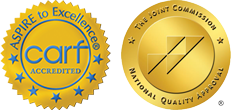Mental illness and substance abuse often occur together. About half of the people with substance use disorders will also have a mental illness at some point in their lives, but the reverse is also true. When a person battling addiction, such as alcohol use disorder or substance use disorder, also has a mental illness, such as depression, bipolar disorder, or PTSD (post-traumatic stress disorder), then the two conditions require dual diagnosis treatment. This is usually offered through a residential treatment program because the interaction between the two conditions can worsen both. If you or someone you love has a dual diagnosis, it’s important to get treated at a drug rehab in Washington that provides integrated treatment for the co-occurring conditions. Read on to find out more about getting dual diagnosis treatment in Washington.
In this article, we discuss:
- What is Dual Diagnosis?
- Issues Related to Dual Diagnosis
- How Long Is Dual Diagnosis Treatment?
- Where Can I Get Dual Diagnosis Treatment in Washington?
What is Dual Diagnosis?
As noted, dual diagnosis is the occurrence of substance abuse and mental disorders together. Although these disorders frequently occur together, it is not necessary that one caused the other. It can be challenging to figure out what came first. For example, in one individual depression could lead to alcohol abuse, while in another person drug use could result in anxiety. The picture is not always clear, but researchers believe there are three reasons why mental illnesses and substance use disorders occur together:
- Many risk factors for mental health disorders are also risk factors for substance abuse, such as stress, trauma, and genetics.
- People with mental disorders are at risk of drug use and addiction. For instance, someone with a mental disorder like PTSD (post-traumatic stress disorder) may use alcohol or drugs to self-medicate in an attempt to feel better.
- Substance abuse produces changes in the human brain, making it more likely for a person to develop mental illness. Long-term use of certain drugs leads to brain changes that can cause mental health issues like paranoia, hallucinations, aggression, and anxiety.
Compared to healthy individuals, people with drug addiction are twice as likely to suffer from anxiety and mood disorders. On the other hand, a large percentage of people with mental illness also have substance use disorders.
A residential dual diagnosis treatment program can help address both issues. Simultaneous treatment of both conditions is important for lasting recovery because if only one of the conditions is treated, the risk of relapse is high.
Experts agree that inpatient addiction treatment is a more effective form of dual diagnosis treatment in most situations. At Discover Recovery, a top-rated drug rehab in Washington, dual diagnosis is treated in a safe, supervised environment. At our facility, clients are removed from temptations and triggers and have a chance to focus on recovery without interference from the distractions of daily life.
The treatment methods can unique to each individual based on diagnosis and history but here is a short list of methods we use frequently at Discover Recovery:
- Cognitive Behavioral Therapy
- Dialectical Behavior Therapy
- Evidence Based Treatment
- Mindfulness Based Cognitive Therapy
- Holistic Therapy
- Individual Therapy
- Meditation Therapy
- PTSD Therapy
- Somatic Experiencing Therapy
- Anxiety Treatment
- Depression Treatment
- Group Therapy
- Trauma Therapy
Issues Related to Dual Diagnosis
Certain issues make dual diagnosis treatment challenging. For instance, it can be difficult to establish whether a client’s symptoms are mainly due to drug use, mainly due to mental health conditions, or a combination of the two. Besides, it is often difficult to engage a person with addiction and mental illness into treatment and motivate them to complete it.
Do you have a loved one struggling with addiction?
We know how hard that can be. Give us a call to find out what options you have.
The staff at Discover Recovery drug rehab in Washington have considerable experience in treating dual diagnosis. Our residential treatment program usually lasts between 30 and 90 days. Clients receive the psychotherapies, experiential therapies, and support groups they need to achieve stable, lasting sobriety from both mental illness and substance abuse. We focus on addressing issues related to both conditions, knowing that the relapse of one condition increases the risk of relapse of the other.
Another concern during dual diagnosis treatment is that there can be interactions between prescribed medications for mental illness and alcohol or drugs. For this reason, dual diagnosis clients need to enter a residential treatment program, where any complications that arise are diagnosed and treated promptly. Intensive care can only be provided at an inpatient dual diagnosis treatment center in Washington, and without it, there is a risk of adverse effects and overdose.
How Long Is Dual Diagnosis Treatment?
Unfortunately, there is no quick fix for drug and alcohol rehab or mental illness. When the two conditions co-occur in a patient, it takes even more care and patience to treat them successfully. Therefore, dual diagnosis treatment can take longer to complete. The best results are usually achieved through a specialized residential treatment program that addresses the unique issues of each client. Dual diagnosis looks different in every patient. It can consist of any combination of illnesses, for example, alcoholism and anxiety disorder, or gambling addiction and depression, or drug abuse and PTSD. That’s why it’s important to get treatment at a dual diagnosis treatment center in Washington that customizes the therapies and develops an individualized treatment plan for each client.
The treatment needs to move at a pace that is comfortable for the client and will result in long-term relapse-free recovery. Rushing through treatment can do more harm than good. Not every drug rehab in Washington is equipped to deal with these complex issues.
Where Can I Get Dual Diagnosis Treatment in Washington?
The dangers of addiction are compounded in someone with mental illness. People with dual diagnosis experience higher rates of physical health complications, suicidal ideation, antisocial behavior, violence, homelessness, and incarceration. Young people are particularly vulnerable and are at high risk of experiencing poor outcomes without appropriate dual diagnosis treatment. Also, the effects of dual diagnosis can be accentuated in older adults due to aging and isolation.
Dual diagnosis treatment in Washington can prevent many of the long-term consequences of mental illness occurring together with drug and alcohol use disorders. The important thing is to choose the best drug rehab in Washington that can provide integrated treatment. Unfortunately, many drug rehabs in Washington are not equipped to treat dual diagnosis patients.
At Discover Recovery, we understand that dual diagnosis is a challenging problem for clients to overcome. We also know that dual diagnosis treatment can be complicated. To give you the best chance of recovery, we have a multidisciplinary clinical team that includes masters-level clinicians, counselors, and board-certified physicians with expertise in addiction medicine. The residential treatment program at Discover Recovery is designed to address the unique issues encountered in dual diagnosis. If you or a loved one needs dual diagnosis treatment in Washington, don’t let the stigma of mental illness and substance abuse treatment deter you from seeking help. Call us today and take the first step towards long-term recovery.





